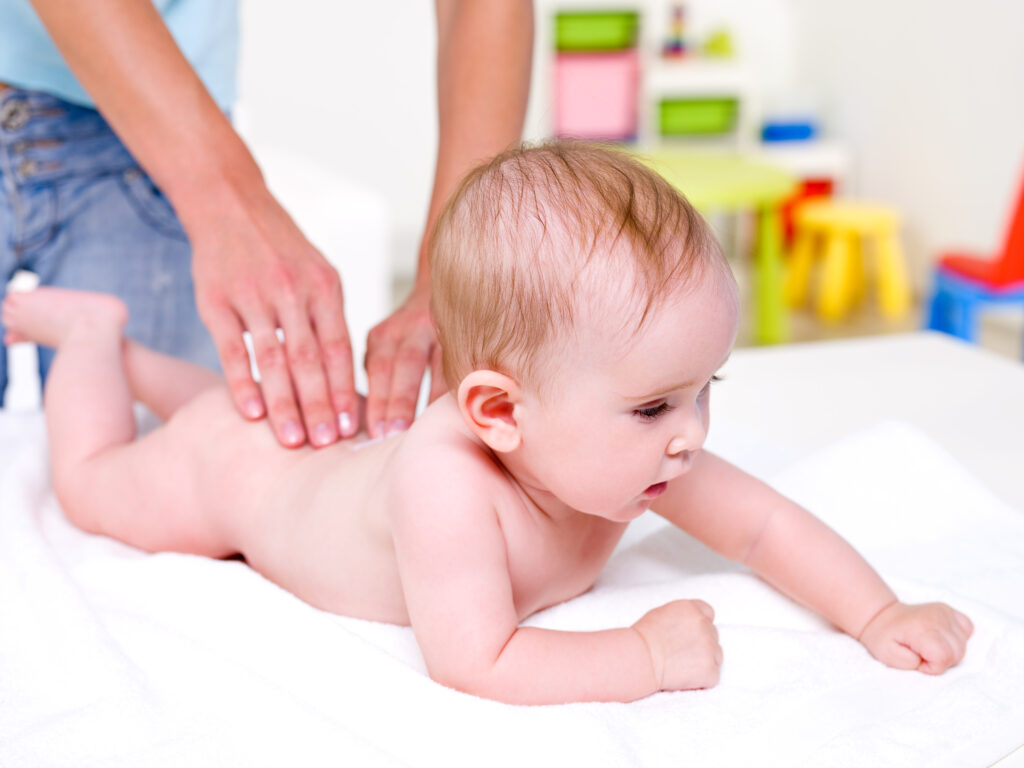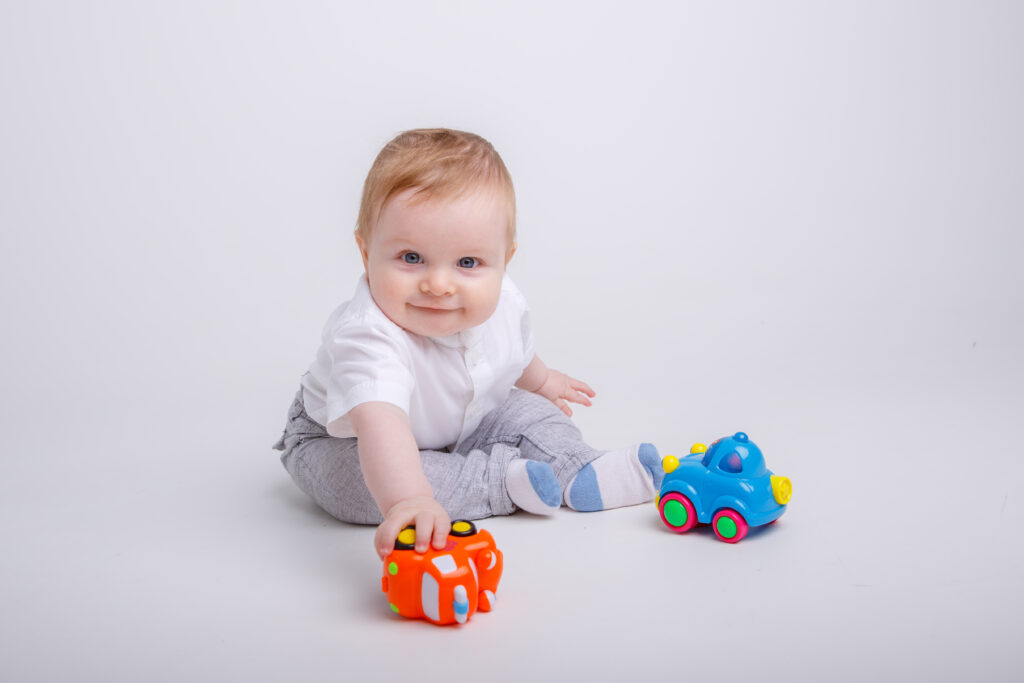In this article:
- General care tips for a one-month-old
- What you need to know about feeding allergies
- Overfeeding in a one-month-old baby
- Underfeeding in a one-month-old baby
- The common concerns of parents of a one-month-old
- How can you help your baby build neck strength at one month of age?
- How much milk does a one-month-old need on average?
- What sensory development does your baby have at one month?
Life with a one-month-old is super exciting, super tiring, and super cute. However, there are also multiple downsides, and caring for such a small baby that cannot express anything (except crying!) is sure to keep you on the edge. Here are a few things that you should keep in mind while caring for your one-month old.
General care tips for a 1-month-old
- Taking care of a one-month-old is no easy feat. Keeping calm is the key; although your baby might not be sleeping through the night yet, they will catch up soon.
- Monitor your baby’s weight. Healthy newborns regain their birth weight within the first month and then gain around 200 g each week for the first 3 months of life.
- Playing with and getting to know your child will help their muscles and skills grow and develop. Give your little one lots of tummy time for a few minutes a few times throughout the day.
- Oil massage, daily vitamin D, and exposure to sunlight during the early morning hours are a must for your baby’s growing bones.
What you need to know about feeding allergies?
Your one-month-old can be susceptible to “feeding allergies” or “digestive Here are some signs that your child may have a feeding allergy or digestive problem that you should talk to your pediatrician about:
- After a full feeding, your baby vomits most or all of the milk.
- Your baby has severe skin rashes, loose and highly watery stools eight or more times a day, or blood in the stools.
Overfeeding in a one-month-old baby
Yes, you heard that right. It is possible to overfeed a 1-month-old baby. Overfeeding: breastfeeding makes it difficult to overfeed, but formula-feeding could be the cause of this.
- The amount of milk consumed per feeding is more than 4-6 ounces if your baby is bottle-fed (120 to 180 ml)
- Your baby is gaining too much weight (the normal monthly weight gain is 800-1500 grams).
- Your baby has loose, watery feces eight or more times a day.
- After a full feeding, your baby vomits most of the feed. It’s worth noting that breastfed babies have much more frequent and loose feces than formula-fed newborns.
Underfeeding in a one-month- old baby
Similar to overfeeding, underfeeding or too little feeding is possible in a one-month-old baby. The following are some potential feeding-related indicators that you should discuss with your pediatrician:
If your baby is breastfed, they will stop sucking after 10 minutes or fewer.
Your baby is taking fewer than 6 feeds per day.
- Your baby is not passing urine 6–8 times per day. If they have started sleeping through the night, they may be feeding inadequately (as most newborns must feed at least 2-3 times during the night).
- Your baby is becoming moderately dehydrated.
- They have infrequent or very hard stools in the first month, and they appear hungry, looking for something to suck on quickly after feeding.
- Inadequate weight gain (600 g per month.)
- During the first week, your baby’s skin turns more yellow rather than less yellow.
The common concerns of parents of a one-month-old
How can you help your baby build neck strength at one month of age?
Your baby, at one month of age, doesn’t have enough neck strength to hold their neck and balance their head by themselves. However, you can promote their neck strength in the following ways:
- Support their head and neck with your hand while carrying them on your lap. Gradually reduce the support daily. Move around the house, carrying them in your arms.
- Tummy time: Put your baby on their tummy for a few seconds (15–30 seconds initially). As per your baby’s interest and response, gradually increase the time daily. Engage them with a toy or by talking to them when on their tummy.
- Infant massage strengthens the muscles of the body. Hence, give your infant a neck massage regularly.
How much milk does a one-month–old need on average?
A one-month-old infant takes approximately 660 ml to 840 ml of milk each day in 24 hours, spread out over 8–12 feedings.
What sensory development does your baby have at one month?
In the first month of life, your baby’s sensory development occurs in multiple areas like vision, hearing, touch, etc.
1. Vision
Your baby is drawn to light and will stare at a sunny window or lamp. They’ll focus on you or a bright toy if you hold it approximately 20 cm (8–10 inches) in front of their face. They’ll be able to follow slow movements in and out and side to side with their eyes. High-contrast black and white toys are the easiest for your child to recognize at this age.
2. Hearing
From the 7th month of pregnancy, your baby could hear some background sounds while still in the womb, such as music, your voice, or a vacuum cleaner. Now that your baby is born, they may find these familiar sounds soothing, occasionally moving their head towards the source of the sound.
They might also hear the soft jingling of a small bell, but they won’t be able to figure out where it is. On the other hand, your baby will react to sudden noises by tensing up, blinking, reaching out with arms and legs with fingers and toes spread, and sometimes crying.
3. Touch
When exposed to firm and gentle infant massage, your baby’s tactile sense develops. They understand, recognize, and love your touch. Your touch is a form of communication for your baby.
What are the physical developments of a one-month old baby?
- Most of what one-month olds do is due to reflexes. They don’t consider the implications. If you stroke their lips and chin, they’ll start searching for milk and breasts. They will clutch anything you put in their palms (though they will usually keep their hands curled into tight, tiny fists).
- At one month, infants should be able to track a moving object from 10 to 12 inches away. They will choose to observe a human face rather than an object. You should expect your baby to stare at you! Most newborns recognize their parents by now.
- One-month-old babies appreciate hearing your voice but are intimidated by loud noises. They may recoil, extend, blink, and exhale faster upon hearing loud noises.
- When placed on their tummies, most newborns can raise and turn their heads before the end of the first month. As their neck muscles strengthen, your baby may move and lift their head while being carried.
- When your baby is happy, they will gurgle. You should respond to your baby’s sounds by gurgling and cooing. This way, you will teach them the basics of communication. Not to mention, it’s a great way to bond with your little one.
- Babies cry to express their displeasure. Not all cries mean your baby is uncomfortable or needs something from you. Sometimes babies cry to communicate that they need your attention.
- Some newborns learn to suck their fingers or thumbs at one month. Help them suck their fingers to make them relax.
In a nutshell
Parenting a one-month-old can seem daunting at first. But with the right knowledge and information, you can easily become a super parent! Parenting is never easy, but being unprepared and panicking can make things worse. Setting up a routine for your baby and yourself is the best thing you can do as a parent of a 1-month-old. Be calm, rest properly, and cuddle with your baby, everything else will fall into place!
What concerns are you facing as the parent of a 1-month-old? Did you find this blog useful? Do let us know in the comments below.










One Response